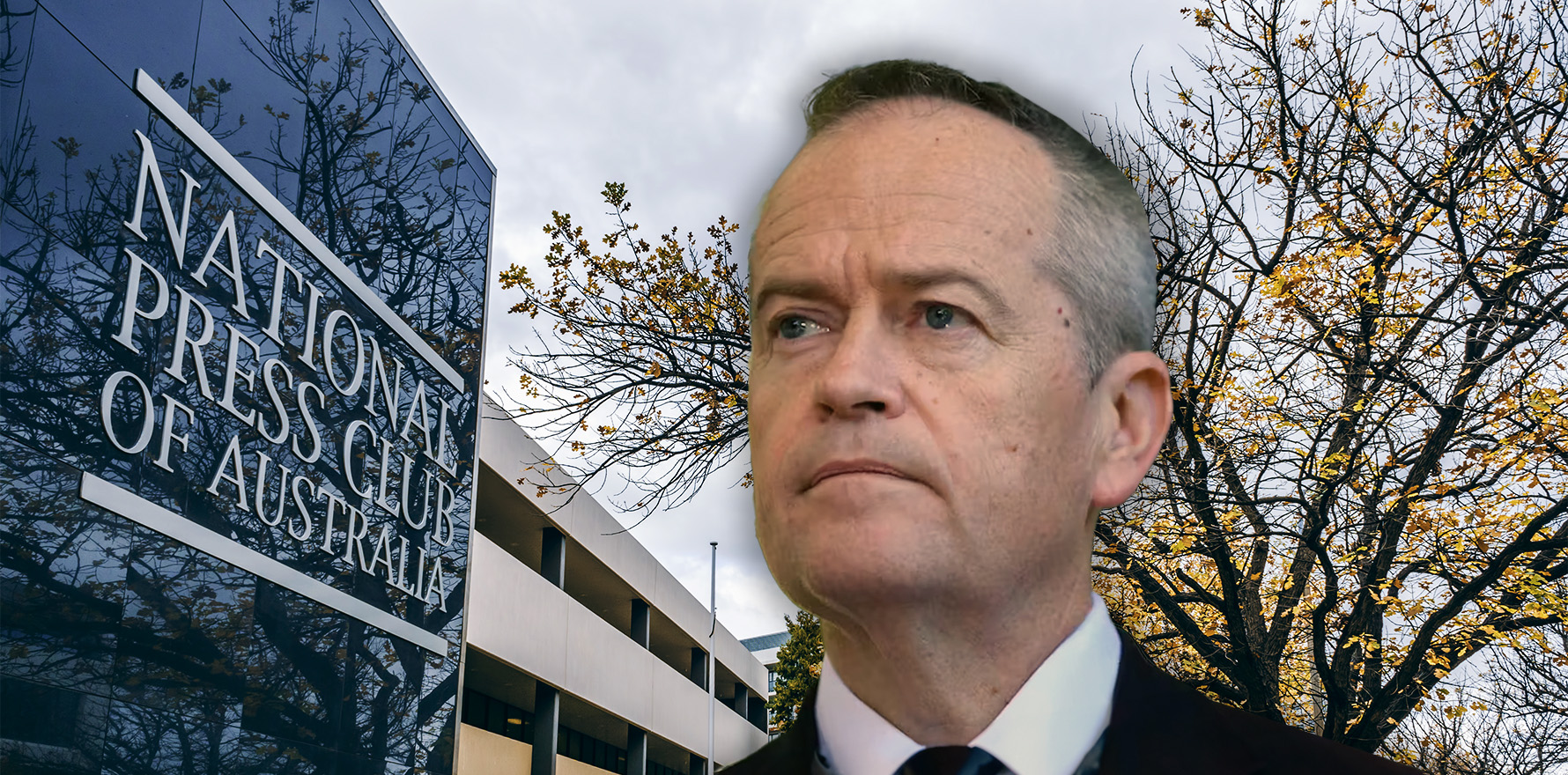NDIS Minister Bill Shorten fronted the National Press Club just hours after the landmark NDIS Review report was released.
NDIS Minister Bill Shorten has told the National Press Club that Australia is “never going back to the bad old days” for people living with disability, and their families.
Instead, the NDIS Review, for which the report came out yesterday, is about rebooting the system – NDIS “Mark II” – and getting the scheme back on track.
The review recommends several major changes, including directing people to services both in and out of the NDIS – so-called “foundational supports” – in conjunction with states and territories, creating a “navigator” workforce to connect people with those services.
There will also be changes for service providers, including only providing payment to those registered with the NDIS. The changes are estimated to take five years to implement in totality.
“These are big changes being suggested but nothing is going to change overnight. This game will keep growing the focus is on the future. We are doing things with people not to them,” Mr Shorten said in his address.
“No one wants to go back to the days of the misery Olympics, when Australians were at the mercy of a broken system … when Australians or disability were forced to rely on charity to fundraise for wheelchairs or a place to live. No one wants to go back to that midnight anxiety faced by the 80-year-old parent carers … wondering who will look after their disabled son or daughter when they no longer can.”
The review revealed that the NDIS needed to change focus, he said, to centre people with disability, restore trust in the NDIS, and ensure the system was sustainable.
And it was facing five key challenges.
“One, why is the NDIS an oasis in the desert? Two, what does reasonable and necessary support mean [for the NDIA]? Three, why are there many more children on the NDIS than initially expected? Four, why aren’t NDIS markets working? Five, how do we ensure that the NDIS is sustainable?” Mr Shorten said.
People with disability should not have NDIS services as their only options, he said.
“The review heard about the erosion of non-NDIS disability support since the introduction of the scheme turning it into the only lifeboat in the ocean. Now the review recommends ways to fix this design flaw,” he said.
The new version of the NDIS aims to provide individualised support, enabling people who could better and more quickly have their needs met by non-NDIS services to do so, with additional “foundational supports” provided in cooperation with states and territories, Mr Shorten explained.
He was quick to reassure families that the document contained “no radical change … at all” and that changes would not “happen overnight or next week or even next month”.
“And of course, we’ve got to make sure that we actively create the foundational supports. I understand that is a condition,” he said.
“It’s a package deal. I’m confident that as we work with people, as we work with our school systems, with our childcare system, as we develop our workforce, I’m confident we’ll get it right. And at every stage we will be listening.”
Proceedings at the National Cabinet meeting earlier this week had given Mr Shorten confidence that the states and territories would work together to provide these foundational supports.
“Yesterday was the day when the nation’s political systems worked,” he said.
Ensuring that NDIS services were not the only option would also increase access for people in regional areas, Mr Shorten added when questioned.
“We think that there’s different ways to deliver the services which means that people can actually utilise their packages. One of the inequitable things is you might have a package for $40,000 but because there’s nowhere there to help you with the needs you have, you don’t actually utilise it,” he said.
“If we could work out a way that part of their package is funnelled through an accredited service provider in a thin market, so that employer that can offer meaningful work to [speech pathologists] or [occupational therapists] or psychologists in that community, and everyone can actually get real utilisation.”
Providing access to supports – on and off the NDIS – was a key area addressed by the review, said Mr Shorten.
“The review wants to give people disability in their families more help to find their way around Australia’s disability support systems. Currently, there is no single point of contact for people with disability who are trying to navigate the NDIS this confusion makes it more likely that people will miss out on the services that they need,” he said.
“Confusion is a fairness issue, not least because the two largest cohorts in the scheme are autistic people and people with intellectual disability.”
The review recommends having two kinds of navigators – general navigators to connect people with mainstream services, and specialist navigators for more complex services.
Doing this would take time, Mr Shorten said, but he had “no doubt that many of the good people working as support coordinators and other coordinators will make outstanding navigators”.
The NDIS planning process needed to be humanised, the review found, with previous processes “traumatising”, “dehumanising”, and “like a second full-time job”, Mr Shorten said.
“People are tired of having to prove every year that they’re still blind or in a wheelchair or have Down syndrome. People are tired of having support budgets that make no sense,” he said.
“Applications should be based on need, not rely solely on medical diagnosis; no longer ‘what is your label?’ but ‘how does your impairment affect your life?’”
What was reasonable and necessary would still be determined on an evidence basis, he said.
“Crystal therapies, overseas cruises and dolphins – they’re out,” he said.
Furthermore, expensive reports required for application should be paid for by NDIA, he said, and assessments would be done in person by qualified assessors, without a time limit, unlike in the previous system. In addition, once the assessment was made, the assessor would go back to the applicant and discuss it.
Almost half of NDIS participants were children – something not anticipated in 2011, said Mr Shorten. Provision of services often relied on diagnosis rather than need, there was frequently delay in accessing those services, and they did not always meet best practice; nor were they always evidence based, he said.
“The review just wants to ensure that children with disability and developmental concerns are identified as soon as possible to give them the best chance,” he said.
“They also want early intervention to be based on evidence and family centred practices that are proven to deliver the best outcomes for children. Importantly, it shouldn’t matter whether these supports come from inside or outside the NDIS.”
A “lead practitioner” with expertise in child development would coordinate care for children and their families.
Mr Shorten also drew attention to the stigma experienced by autistic Australians.
“You are part of not just the disability community about the Australian community,” he said.
“You deserve better than unfounded gossip and needless anxiety … If you read the report, you will see it recommends removing diagnosis as the primary basis for entry into the scheme because that approach is actually unfair.
“The recommendation is to create a unified, connected system of support and most importantly, support levels that are matched to need.”
Another big change was the to the way people with mental health needs would be supported.
“The scheme hasn’t worked as well as it should have for participants with a psychosocial disability,” Mr Shorten said.
“Current approaches to planning don’t take enough account of the episodic nature of these disabilities. And in addition, services are not always based on what we know works well.”
The new approach would focus on recovery and create early intervention pathways and foundational support for people who were not on the NDIS, connections with the public mental health system, and new standards for service providers, said Mr Shorten.
“To be very clear, it is the intention of the review that people with psychosocial disorders that are significant and permanent will remain covered by the NDIS,” he added.
Changes were announced into housing and living support.
“Many participants don’t get to choose where they live, or who they live with. At best, this state of affairs is manifestly unfair,” said Mr Shorten, pointing out that living conditions required oversight.
“We have to get rid of the riders and the criminals and the slum landlords who were using house and living supports to take advantage of people with cognitive disabilities and create real choices for people with disability.”
The review recommended the option of funding support shared with other people.
“Sharing supports doesn’t mean you have to share a house. It is hoped that sharing would actually help people connect with others having the flexibility to form crucial friendships to address the isolation faced by too many people with disability,” Mr Shorten explained.
Quality, safety and equity was a big concern for the review, said Mr Shorten.
“This is a critical area of reform because, frankly, it’s our fellow Australians with a disability who suffer most because of the fraud and exploitation in the NDIS,” he said.
In a big shift, the NDIS would only pay registered providers. Registration process will differ according to the level of risk. The changes are not immediate.
“We don’t want people to lose support and we want to work through the circumstances,” said Mr Shorten.
“And providers would be involved in designing and testing the system to make sure works before we finally introduce it.”
For businesses concerned about how the changes would affect their business model, Mr Shorten said there was nothing to worry about – for those who did their job honestly and well.
The Minister did not have figures on how much of a role reducing fraud, price gouging and over-servicing would play in bringing down the current rate of growth from 14% to 8%, the target agreed by National Cabinet yesterday.
“My own gut instinct is that there are some people having a lend of the scheme; not the people on it, but there are some people who are having a party on this scheme,” he said.
“And the party’s got to stop. I do think there is waste. I do think there is criminality.
“I think all of these reforms collectively will contribute to better outcomes for participants. And that’s what makes it virtuous. Better outcomes for people with disability equals better economics.”
Read the full NDIS Review report here.



